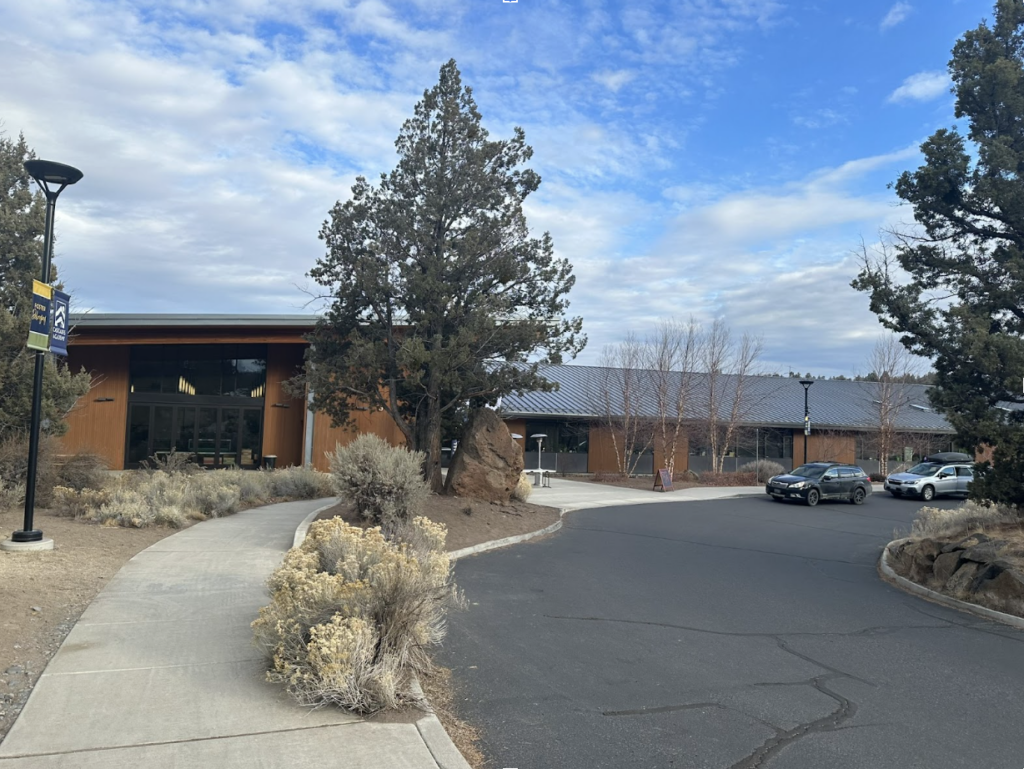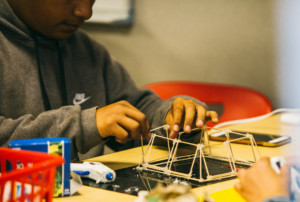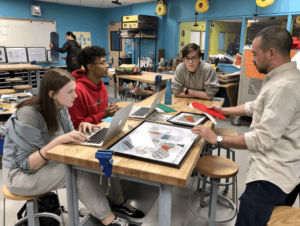Outdoor and Experiential Learning Across the Country
Key Points
-
Schools that are deeply rooted in place can connect young people to purpose, opportunity and the burgeoning green economy.
-
Multi-day expeditions and explorations are a great way to invite students into work that matters.

Just north of Bend, Oregon in the shadow of Mt. Bachelor is Cascades Academy, a small K-12 independent school focused on experiential learning. The beautiful building (featured image) sits on 52 wooded acres on the Deschutes River adjacent to Tumalo State Park.
The Cascades staff shares a beautiful set of values: cultivate belonging, empower individuality, learn by doing, ignite curiosity, embrace challenge, and share joyfulness.
Traveling School is a week-long Oregon adventure in the fall. This year’s trips included the following destinations:
- 6th grade: Oregon Coast Exploration in Newport
- 7th grade: Shakespeare in Ashland
- 8th grade: Backpacking in Three Sisters Wilderness
- 9th grade: Water in the West in Southern Oregon
- 10th grade: Coastal Communities in Astoria
- 11th grade: Layers of Place in Mt. Hood
- 12th grade: Land Stewardship in Joseph and the Wallowas
In the spring, Traveling School includes national and international destinations and is designed to focus on the school’s core values and advance social emotional learning.
Upper School Expeditions are trimester experiences supported through purposeful community partnerships. Every other week, the entire upper school departs campus for a three-hour deep-dive afternoon program. In collaboration, students work to inspire goodness, developing meaning and shaping impact.
In addition to enjoying outdoor education on the beautiful Cascade campus, during winter, everyone enjoys weekly ski/snowboard days at Mt. Bachelor.
The Middle and Upper schools feature personalized and competency-based learning. Cascade was an early member of the Mastery Transcript Consortium.
Outdoor Discovery Center
Western Michigan supports four seasons of outdoor learning with lakes, great and small, waterways, sand dunes, forests and fields. Based in Holland, Outdoor Discovery Center helps families and school communities access outdoor learning.
Launched 24 years ago, the ODC Network operates two greenway projects, a watershed clean-up initiative, three nature-based preschools, two nature centers, multiple wildlife preserves, eco-tours, and a land conservation and restoration business. The Network owns over 800 acres and manages an additional 2,000 acres of property. It provides programming to over 100,000 children and works with 30 area schools.
ODC partnership projects include:
- Forest School at Holland Christian Schools offers K-4 students time outdoors each day in the wooded Holland Christian campus or local natural areas.
- STREAM School at Hamilton Middle School is an outside-of-the-classroom semester experience in 8th grade. The waterway experiences connect students to Agriscience and Natural Resources pathways while learning English and science standards.
- Nature-based learning at Holland Heights Elementary (K-5) includes weekly offsite learning experiences and extended time in the community and nature.
- Teen Voices of Fennville is a new design project to better determine what in- and out-of-school learning experiences the community is looking for.
- Another new project is an alternative credit recovery pathway which includes place-based learning, career pathways, and a work-based learning stipend.
- Hope College Global Water Research Institute partnered with the ODC to monitor both lake and stream sites within the Macatawa Watershed.
EL Education
Born out of a collaboration between the Harvard GSE and Outward Bound, Expeditionary Learning, now EL Education, is a network of schools committed to mastery of knowledge and skills, character building, and high-quality work. Learning at EL schools results in quality work about genuine problems for a real audience.
Casco Bay High School in Portland, Maine keeps the school’s goals “clear, ambitious and essential.” Learning Expeditions are long-term in-depth studies of a single topic that explore compelling social and environmental questions, incorporate vital standards, involve fieldwork, and culminate in an authentic project, product, or performance.
Casco Bay Quest, a three-night, four-day expedition in outdoor adventure and personal writing, launches the freshman and senior years. Casco juniors engage in a long-term interdisciplinary project that results in a demonstration of learning. Last spring, in partnership with Acadia National Park, the Class of 2024 researched the rise of green crabs in the Gulf of Maine and its relation to climate change, using scientific data and communication. (See four part series.)
Launch Expeditionary Learning Charter School in Brooklyn is a middle school dedicated to putting students at the center of their learning. At each grade level, students take part in a six-eight week cross-curricular Case Study.
Launch will expand to serve K-12 learners and will relocate to South Brooklyn’s Floyd Bennett Field in an underutilized national recreation area. Fully realized, this campus, which will house half a dozen exceptional partner organizations, will be able to serve up to 50,000 students per year participating in learning and career pathway programs focused on careers in the green economy.
Zoo Schools
School of Environmental Studies, on the campus of the Minnesota Zoo, is a magnet school for juniors and seniors that immerses its students in the study of environmental topics and issues.
Science and Math Institute at the Point Defiance Zoo in Tacoma is a great STEM school with built-in internships and outdoor science. (See feature)

Place-Based Schools
Teton Science Schools in Wyoming is the leader in place-based education
including a K-12 school, outdoor education programs, a graduate school, and a national network. (It inspired The Power of Place.)
Environmental Charter School (K-12) at Frick Park in Pittsburgh uses its theme to build systems thinkers, explore complexity and develop problem-solving skills in a multidisciplinary, “out-the-door” learning approach that builds active, engaged, and empathetic citizens. Through an innovative, eco-literacy-based curriculum, ECS grows active, engaged, empathetic citizens who are critical thinkers and purposeful agents of change.
Outdoor Classrooms
Mukilteo Elementary, north of Seattle, makes great use of the Leader in Me program to empower student leadership. They finish each year with a family portfolio picnic where they review quality student work. Students also help to develop a nature preserve with trails and a two-acre outdoor classroom. (See feature.)
Wildwood Elementary School where the campus inspires creative learning and community. An outdoor classroom centered in the school garden engages students to think deeply about the natural systems. Tec D.E.C. (Design, Explore, Create) serves as both a maker studio as well as a STEM-based lab space for hands-on exploration.
For more on outdoor education:
- The Power of Place: Authentic Learning Through Place-Based Education
- Town Hall Recap: Every Place is a Place
- Going Green: National Network Incorporates Sustainability into Teaching and Operating Schools
- Dr. Roberta McFarland on The Magic of Outdoor Education (podcast)
- Place-Based Learning: Solid Ground in Troubled Waters
- Edible School Yard: A Place to Influence Interdisciplinary Skills
- Place & Peace Based Learning: James’ story








0 Comments
Leave a Comment
Your email address will not be published. All fields are required.